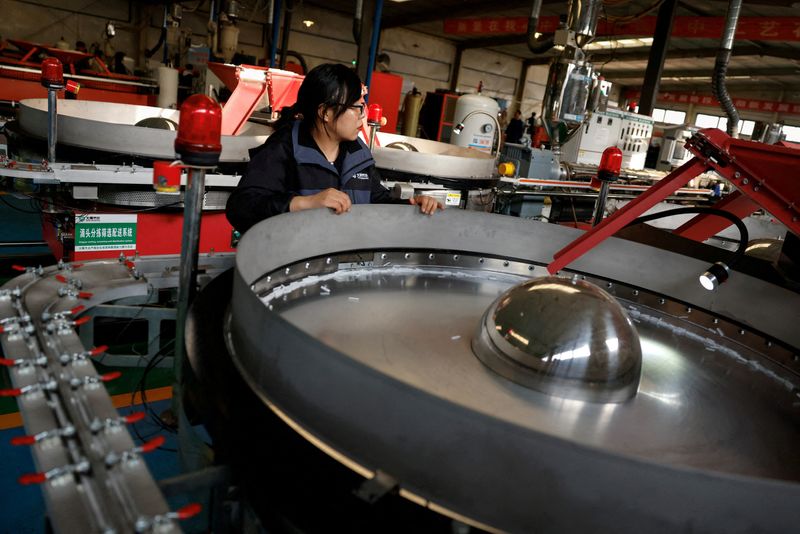Select Language

By Ellen Zhang and Kevin Yao
BEIJING (Reuters) -In one of their most dovish statements in more than a decade, Chinese leaders signalled on Monday they are ready to deploy whatever stimulus is needed to counter the impact of expected U.S. trade tariffs on next year's economic growth.
After a meeting of top Communist Party officials, the Politburo, officials said they would switch to an "appropriately loose" monetary policy stance, and "more proactive" fiscal levers.
The previous "prudent" stance that the central bank had held for the past 14 years coincided with overall debt - including that of governments, households and companies - jumping more than 5 times. Gross domestic product (GDP) expanded roughly three times over the same period.
The Politburo rarely details policy plans, but the shift in its message shows China is willing to go even deeper into debt, prioritising, at least in the near term, growth over financial risks.
"From prudent to moderately loose is a big change," said Shuang Ding, chief economist for Greater China and North Asia at Standard Chartered (OTC:SCBFF). "It leaves a lot of room for imagination."
Tang Yao, associate professor of applied economics at Peking University, says this policy reset is needed, because slower growth would make debt even more difficult to service.
"They've by-and-large made peace with the fact that the debt-to-GDP ratio is going to rise further," said Christopher Beddor, deputy China research director at Gavekal Dragonomics, adding that this was no longer "a binding constraint."
It's unclear how much monetary easing the central bank could deploy and how much more debt the finance ministry could issue next year. But analysts say that works in Beijing's favour.
U.S. President-elect Donald Trump returns to the White House in January, having threatened tariffs in excess of 60% on U.S. imports of Chinese goods.
The timing and the ultimate level of the levies, which a Reuters poll last month predicted at nearly 40% initially, will determine Beijing's response.
"They are willing to do 'whatever it takes' to achieve the GDP target," said Larry Hu, chief China economist at Macquarie.
"But they will do so in a reactive way," Hu said. "How much they will do in 2025 will depend on two things: their GDP target and the new U.S. tariffs."
Next (LON:NXT) year's 2025 growth, budget deficit and other targets will be discussed - but not announced - in coming days at an annual meeting of Communist Party leaders, known as the Central Economic Work Conference (CEWC).
Reuters reported last month that most government advisers recommend that Beijing should maintain a growth target of around 5%, even though that pace seemed difficult to reach throughout this year.
The tone of the Politburo statement suggests that China won't lower its growth ambitions for 2025, says Zong Liang, chief researcher at state-owned Bank of China. But it also suggests that China is likely to set an initial budget deficit target of around 4%, its highest ever.
"Beijing may want to use the 'around 5.0%' growth target to show that it won't cave to Trump's threatened 60% tariff and other restrictive measures imposed on China," said Ting Lu, chief China economist at Nomura, who also expects a 4% fiscal deficit, up from 3% in 2024.

